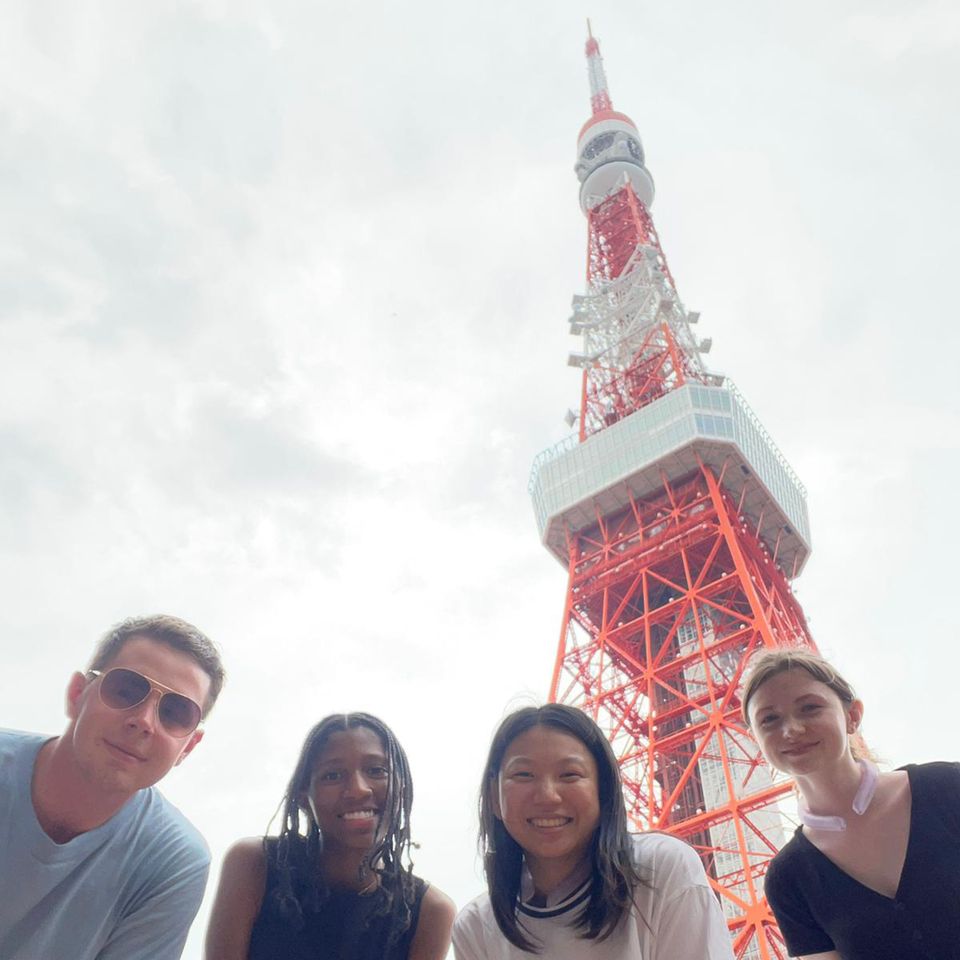Top 10 Japanese Slang Words & Phrases You Must Know
Textbook Japanese is great and all, but if you really want to impress the locals, you need to know Japanese slang terms. These aren’t the phrases you’ll learn in class – they’re the ones you’ll hear at cafés, in group chats, and while exploring Tokyo or Kyoto’s trendiest spots.
Mastering these Japanese slang expressions will not only make you sound cooler but will also help you connect with the people and culture in a way that’s way more authentic. Whether you're just chilling with your new friends or navigating your favorite ramen shop, knowing these phrases will make you feel like you truly belong. So, let's get you speaking like a pro – no textbook required!
Read More: How to Study Japanese in Japan: 3 Easy Steps
Top 5 Japanese Slang Words
If you’re eager to sound like a local when you study abroad in Japan, these top 5 Japanese slang words will have you sounding smooth in no time. Use them when you’re studying abroad, and you'll fit right in with the crowd!
Japanese Slang Word #1: Yabai (やばい)
Meaning: Dangerous, crazy, or amazing (depending on the context)
Originally meaning "dangerous" or "critical," yabai is now used to express anything that’s surprising, cool, or even something that’s bad in a dramatic way. It's a versatile term, often used in casual conversations to convey excitement or shock.
For example: “このラーメン、やばい!めっちゃ美味しい!” – “This ramen is crazy good! It’s so delicious!”
Japanese Slang Word #2: Bimyou (微妙)
Meaning: Subtle, questionable, or "iffy"
Used to describe something that’s not great but not terrible either. It’s like when you’re not sure if something is good or bad.
For example: “この映画、ちょっと微妙だったな…” – “That movie was a little ... iffy”

Japanese Slang Word #3: Wakarimashita (わかりました)
Meaning: Got it, understood
While wakarimashita technically means "I understand," in slang, it's often used casually and even sarcastically when agreeing to something. It’s commonly used in conversations when you're giving a short, straightforward response.
For example: “これやっといてね、わかりました?” – “Do this, okay? Got it?”
Read More: 2 Best Places to Study Abroad in Japan
Japanese Slang Word #4: Daijoubu (大丈夫)
Meaning: It’s okay, no problem
This term is used to tell someone that everything is fine or that there is no issue. It can also mean "Are you okay?" when asking if someone is all right.
For example: “もう遅くなったけど、だいじょうぶ!” – “It’s getting late, but it’s okay!”
Japanese Slang Word #5: Kawaii (かわいい)
Meaning: Cute
Kawaii is one of the most well-known words outside Japan. It refers to something that’s adorable, charming, or sweet. While used for people, it can also describe things like clothes, animals, and even situations!
For example: “あの猫、めっちゃかわいい!” – “That cat is so cute!”

Read More: How to Study Abroad in Japan: 4 Simple Steps
Top 5 Japanese Slang Phrases
Now that we’ve covered some slang words, let’s dive into the must-know Japanese slang phrases!
Japanese Slang Phrase #1: Majide (マジで)
Meaning: "Seriously?" or "No way!"
This phrase is used when you’re shocked or amazed by something. It's similar to saying "Are you serious?" or "No way!" in English. It can also express excitement or disbelief, depending on the context.
For example: “マジで!? 彼が優勝したの?” – “Seriously?! He won?”
Read More: 7 Best Japan Study Abroad Programs
Japanese Slang Phrase #2: Urusai (うるさい)
Meaning: "Noisy" or "Shut up!"
While it literally means "noisy," it’s often used to tell someone to be quiet or stop annoying you in a playful or irritated way.
For example: “うるさい!今、集中してるんだよ!” – “Shut up! I'm trying to focus right now!”
Japanese Slang Phrase #3: Sore na (それな)
Meaning: "Totally!" or "I know, right?"
This phrase is often used to express agreement or emphasize how much you relate to something someone else has said. It’s like saying, "I feel you!" or "I agree completely."
For example:
- A: “昨日の映画めっちゃ面白かったよね!”
- B: “それな!”
- Translation A: “That movie yesterday was so good!”
- Translation B: “Totally!”

Japanese Slang Phrase #4: Wakaru (わかる)
Meaning: "I get it" or "I know"
This is a very casual phrase used to show understanding or empathy, like saying "I feel you" or "I get where you're coming from." It’s commonly used in conversations to show you relate to the speaker.
For example:
- A: “彼女、いつも怒ってるよね。”
- B: “わかる ...”
- Translation A: “She’s always angry.”
- Translation B: “I get it ...”
Japanese Slang Phrase #5: Yoroshiku Onegaishimasu (よろしくお願いします)
Meaning: "Please take care of it" or "I’m counting on you"
While this phrase is commonly used in formal situations, in casual contexts, it can be shortened or used more informally to imply a request or expectation. It’s a way of saying "I’m trusting you with this" or "I’m leaving this to you." In slang, it's used casually with friends to ask for a favor or to show trust.
For example:
- “今日は一緒に行ってくれる?ちょっと頼むね。”
- “うん、よろしくね!”
- Translation A: “Can you go with me today? I’m counting on you.”
- Translation B: “Sure, I got you!”
Take Your Studies to Japan
Now that you’re armed with these Japanese slang words and phrases, you’re ready to take your conversations to the next level! It’s not just about impressing people – it’s about fully embracing Japanese culture and showing you’re not just another tourist.
Why wait? Start your application right now!
Related Posts

EAT, DRINK, EXPLORE: TOKYO
BEST FOOD TO EAT IN TOKYO Since the 17th century, soba (buckwheat) noodles have been a staple in the Japanese diet. These tasty noodles are as thick as spaghetti and... keep reading

The 13 Best Gifts for a Study Abroad Student in 2024
Are you looking for the best gifts to give someone traveling abroad? Perhaps you need to find some study abroad gifts for a student planning to study overseas. You've come... keep reading

5 Reflections from Studying Abroad in Tokyo
Study abroad will change your life! We asked alumni to reflect on their time abroad and share a few tips to help future students prepare for the journey ahead. Check... keep reading

